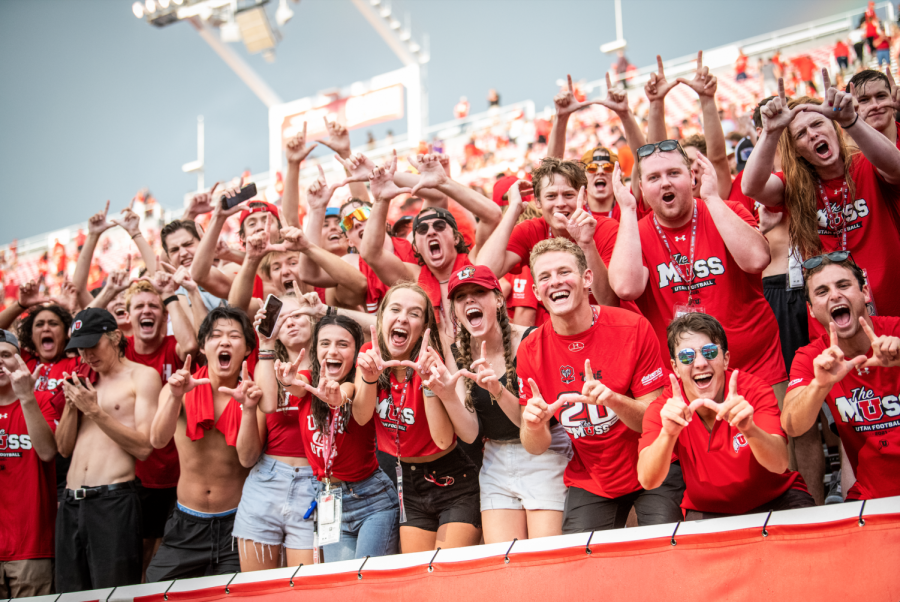Forth: The U Should Stop Hosting Football Games During COVID-19
The MUSS (Mighty Utah Student Section) flashes the U at the football season opener in Salt Lake City on September 2, 2021. (Photo by Jonathan Wang | The Daily Utah Chronicle)
September 16, 2021
I get it. Football games are one of the best parts about college. It feels exhilarating to stand in a stadium and watch your favorite team score a touchdown. But with that exhilaration also comes screaming and standing elbow to elbow in a crowd of thousands — things the CDC warns against at this time. Despite the fun of football games, we are still in a global pandemic. To slow the spread of COVID-19, the University of Utah should stop hosting full capacity in-person football games.
It seemed like the world was going back to normal with the rollout of COVID-19 vaccines, but the unwillingness of many to get vaccinated pushes normalcy farther out of reach.
Even though people above the age of 12 can now receive a the vaccine, only 54% of eligible United States residents are fully vaccinated. Comparatively, only 48% of eligible Utahns are fully vaccinated. These abhorrent numbers make the spike of COVID-19 cases across the country disappointing, but not surprising.
Cases have increased by 300% across the U.S. since this time last year. Case numbers also started increasing in children, with 24% of Utah’s cases occurring in elementary schools. This is especially concerning since children do not have the choice to receive a COVID-19 vaccine. Tragically, two Utah youth have passed away due to this spike in adolescent cases.
The U currently hosts games with opponent schools that require vaccinations for students, with the exception of Arizona State University, who is only encouraging students to get the vaccine. But this will not completely slow the spread. The vaccine may give people a false sense of security to do whatever they want.
A recent study revealed how the virus spreads among fully vaccinated individuals. This study, performed in Massachusetts, discovered that even vaccinated folks can spread the disease. Even though the U now requires vaccinations for its students, and most of the schools it will host also have mandates, cramming everyone into a stadium by the thousands will turn football games into super-spreader events.
If the U decides to continue hosting games, it should take precautions to make the football games safer for attendees. Since the U has already sold all of its MUSS tickets, it should start selling less tickets to the general public and spread students out into empty seats. While ticket sales for home games have already begun, large sections of the stadium still have available seats. The U should utilize these empty rows to encourage social distancing for game spectators. Social distancing will be especially important for football games that last several hours. This high exposure time increases risk of contracting the disease, making the games into super-spreader events.
As of the writing of this article, the U does not currently require masks or proof of vaccination to attend the games. Since the FDA approved the Pfizer COVID-19 vaccine, the U should at least require proof of vaccination so that if the virus does spread, students are less likely to suffer severe consequences of the disease.
I keep hearing the same excuses over and over about how some people don’t care if they get COVID-19 because they’re young, and that masking and social distancing is annoying. I also don’t like the restrictions necessary to keep everyone safe. But the right thing to do is rarely the easiest.
The U’s core values states that they value “being inclusive in every respect.” Hosting potential super-spreader events that increase COVID-19 presence on campus will not only force immunocompromised individuals to stay away from campus but could also threaten their lives.
That doesn’t sound like an inclusive campus environment to me. The U is sending the message that it cares more about the potential revenue gathered from hosting football games than the safety and inclusion of its high-risk students. It’s time for the U to reflect on what is more important: a game, or student safety?









